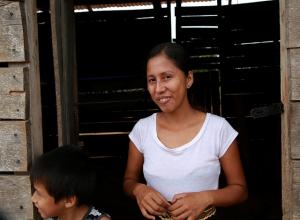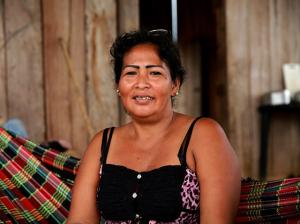CFEBA Grant Lights Up A Village
Nearly 1.3 billion people across the world are living in the dark.
Access to safe, affordable, and reliable energy is vital to ending extreme poverty, promoting shared prosperity, achieving improved educational results and attaining better health outcomes. Power is about more than just lights. Development starts with power.
In 2016, the CFEBA partnered with NRECA International Foundation to support the men and women of U.S. utilities who lend their skills to design and implement rural electrification programs, bringing electricity to parts of the world that lack it. This important new project provided life-changing electricity to 460 families in rural El Beni, Bolivia, a farming region located between the northeastern Bolivian cities of Guayaramerin and Riberalta.
With the support of the generous EBA membership, the CFEBA's delivered improved health, education, productivity, and safety.
Stories from the Field
Below you will find personal stories from the families in Bolivia that are the driving force behind our desire to be a part in this important work, as told by Zuraidah Hoffman, communications manager for NRECA INTERNATIONAL, while visiting the village earlier this month.
Flora
It can be scary walking home at night in a lot of places, but few of us have to worry about men with machetes.

Flora is in her 50s, has 10 children ages 10 to 31 and 20 grandchildren. She lives in Dos de Junio, a community in the Beni district of northern Bolivia. Flora wants electricity for streetlights in her Bolivian community because she fears men with machetes. For Flora, safety is clearly on her mind. Maybe it’s because she has nine daughters; five of them still live with her in a small house. And there is no husband. She moved to Dos de Junio two years ago because the Bolivian government offered people free land. Electricity will come, she was told. She moved her family, cleared the land and built her house, which is not much more than a large room divided by a thin wooden wall separating the bedroom from the main room. Hammocks are hung in a few places, both inside and out. Dented pots and pans are stacked on a table outside and water is hand-drawn from a well that is about 50 feet deep.
I know Flora’s story. I’ve learned about how women and children benefit the most from light, and I’ve interviewed community leaders who want streetlights to discourage criminal activities. I’ve written about it and I’ve talked about it. But I’ve never heard it directly from a woman who lives it. When asked how electricity will change her life, Flora didn’t hesitate. She drove that point home many times. The motorbike taxis won’t come into her community at night because they are afraid, she said. So she walks.
Isabel
Isabel and her son Angel live in Bolivia without electricity.

As our truck stopped outside a small wooden house on a muddy dirt road in Dos de Junio, Bolivia, a young woman walked toward us, with a young boy and girl close by. I looked around, assessed my surroundings and attempted to predict the story that awaited me.
Isabel, 25, agreed to talk with us, but seemed to wish she had more time to clean up her home and put fresh clothes on.
She’s a nurse living on her own with her two children Angel, 6, and Luz, 3. As she patiently answered my questions, her story emerged.
Isabel used to live with her mother in Riberalta, where she still works. Her mother abused her, so as soon as she could, she left. That was two years ago, when she left to build a house at the far edge of this community. She has no electricity, and told us how the mosquitos attack them at nightfall.
We came back later to capture her life after dark. I watched Isabel expertly build a cooking fire against the wall of her house and light a candle so her children could read. It was hot and the air was smoky from the fire. I had to step outside a few times that night.
The house has two beds, no privacy walls, a small cupboard to store belongings, and pots and pans stacked in another corner.
When she can, Isabel brings medicine from the hospital to her community. She wishes for electricity because it’s hard to give injections by candlelight. And with streetlights, motorbike taxis would be able to avoid bumps on the road when taking the sick to hospitals.
The road was pitch black when we left Isabel and her children. They were heading to the hospital to get a free meal, she told us. I wished there was a different story to tell.
